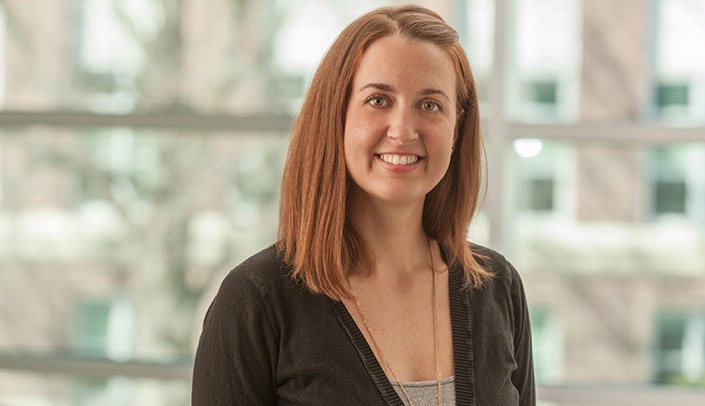Internal Medicine's Behavioral Medicine Program has two main goals; to provide psychosocial care for patients and their families and to provide education on behavioral, emotional and social aspects of healthcare for internal medicine residents.
Jennifer Harsh, PhD, the program's director and assistant professor of the Division of General Internal Medicine, recently received approval to expand the program.
"We currently have a team that consists of myself, one doctoral level and three masters level medical family therapy interns. We are hopeful that next year we will be able to recruit an additional doctoral intern to assist with clinical care, teaching residents and conducting research," Dr. Harsh said.
With successful recruitment, the program's doctoral internship experience would consist of a pre-doctoral year that rolls directly into a post-doctoral fellowship. With both the pre and post-doctoral internship positions full, the behavioral medicine program could expand on teaching and research endeavors and increase access to behavioral health care for UNMC's patients.
Currently, UNMC houses the only internal medicine program in the nation to offer doctoral level training specifically for medical family therapists. With the robust experience in the clinical, teaching, and research realms, previous doctoral interns have gone directly into academic and supervisory roles following their training at UNMC.
Dr. Harsh added, "Doctoral interns provide patient care; they supervise; they teach residents; they guest lecture in specialties like pharmacy, talking about subjects like medical adherence; they publish and present, as well."
Clinically, behavioral medicine providers in the program conduct over 200 patient encounters per month working within the Patient Centered Medical Home model of care at Fontenelle and Midtown Clinics. With the ability to provide brief psychosocial interventions (e.g., relaxation strategies, motivational interviewing for health behavioral change) during patient medical visits and to schedule follow up appointments, patients have access to psychosocial support in a way that fits with their specific schedule and set of needs. The ability of providers to meet with patients during medical appointments assists not only with access, but also acceptability of services. Integration of care in this manner allows for a reduction in stigma and greater patient participation in psychosocial care.
Dr. Harsh said, "Our model of care and availability of behavioral health providers greatly increases the chance that patients will receive much-needed behavioral health services. If a patient is referred to a community provider that they have not met in clinic, statistically, they have about a 70-80% chance of not showing up for that appointment."
"The behavioral medicine program is an integral part of the Division of General Internal Medicine," Tom Tape, MD, division chief, said. "The inclusion of the behavioral medicine team in our division allows patients to receive access to evidence based psychosocial care and provides residents with the opportunity to participate in education aimed at enhancing the patient-provider relationship and recognizing the importance of psychosocial aspects of patient health and illness."
Dr. Harsh said she is grateful that the Division of General Internal Medicine and the Department values the program and thinks it is important to support expanding the behavioral medicine team.
"The Department is proud of the work that Dr. Harsh does with the behavioral medicine program," Debra Romberger, MD, chair, Department of Internal Medicine, said. "She and her trainees in medical family therapy perform a valuable service for the patients at Midtown and Fontenelle Clinics and are an important part of the educational experience for our residents. We are excited for the growth of her program and for the additional patient care, education and scholarly activity that will accompany it."
